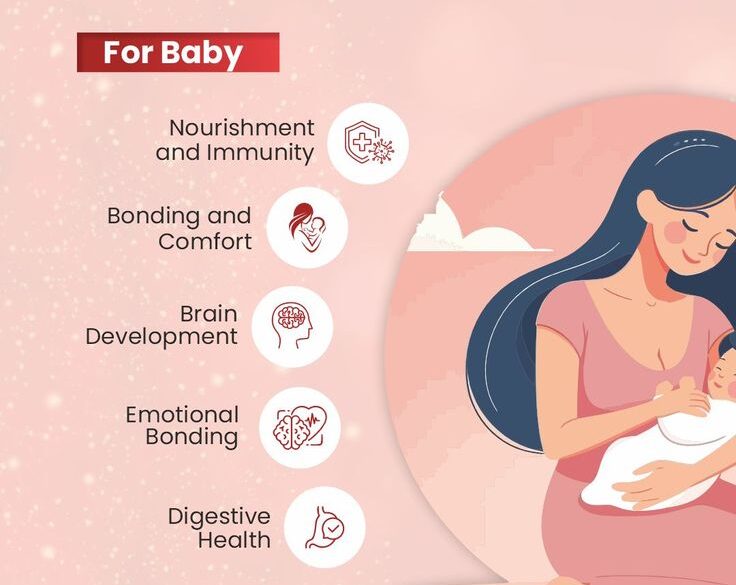👶 7 Powerful Truths About World Breastfeeding Week That Can Change Lives
Each year from August 1st to 7th, the world comes together to celebrate World Breastfeeding Week (WBW)—a global movement that highlights one of the most natural, powerful, and life-saving acts in the journey of motherhood.
- 📜 History of World Breastfeeding Week
- 📆 Timeline of Key Events
- 🌍 Why It Matters: The Significance of Breastfeeding
- 🤱 Interesting & Inspiring Facts About Breastfeeding
- ❓ FAQs About World Breastfeeding Week
- Q1. What is the main aim of World Breastfeeding Week?
- Q2. Who organizes World Breastfeeding Week?
- Q3. What is the theme for WBW 2025?
- Q4. Can fathers be involved in this week?
- Q5. Is formula feeding discouraged?
- 🧭 How It’s Celebrated Worldwide
- 💞 Wishing Messages for World Breastfeeding Week
- 📌 Key Observance Points
- 🧠 Important in Our Lives
- 🧭 Impact on Daily Life
- 🏁 Conclusion: A Week That Changes Lives, One Drop at a Time
In a world full of technological marvels and modern medicine, the simple act of breastfeeding remains unmatched—it is the first vaccine, the first bond, and the first act of love between mother and child.
Let’s journey through the history, purpose, human significance, key facts, FAQs, celebration practices, and why this week matters now more than ever—in a heartfelt, human-friendly narrative.
📜 History of World Breastfeeding Week
The story of World Breastfeeding Week dates back to 1991, when the World Alliance for Breastfeeding Action (WABA) was formed to promote, support, and protect breastfeeding across all nations.
A year later, in 1992, WABA initiated the first World Breastfeeding Week (WBW) in coordination with UNICEF and WHO, aligned with the Innocenti Declaration of 1990 that recognized breastfeeding as a fundamental right and critical to infant survival.
The goal?
To empower mothers and communities, dispel myths, promote workplace support, and normalize breastfeeding.
Now, over 170 countries actively observe WBW every year.
📆 Timeline of Key Events
| Year | Milestone |
|---|---|
| 1990 | Innocenti Declaration adopted by WHO & UNICEF |
| 1991 | World Alliance for Breastfeeding Action (WABA) established |
| 1992 | First World Breastfeeding Week celebrated globally |
| 2015 | WBW aligned with United Nations’ Sustainable Development Goals (SDGs) |
| 2025 | Focus on “Enabling Breastfeeding: Making a Difference for Working Parents” |
🌍 Why It Matters: The Significance of Breastfeeding
Breastfeeding is more than just nutrition—it’s protection, connection, and life-affirming care.
For Babies:
Provides perfect nutrition for the first 6 months of life
Boosts immunity, reducing infections and diseases
Encourages emotional bonding and cognitive development
Reduces the risk of obesity, asthma, and type 2 diabetes later in life
For Mothers:
Lowers risk of breast and ovarian cancer
Helps in postpartum recovery
Encourages natural birth spacing
Fosters an unbreakable emotional connection
For Society:
Reduces healthcare costs
Promotes sustainable food systems
Supports gender equality and maternal health
🤱 Interesting & Inspiring Facts About Breastfeeding
Breastmilk contains live antibodies, enzymes, and hormones no formula can replicate.
The first milk (colostrum) is often called “liquid gold” due to its rich immune-boosting qualities.
Babies who are breastfed have higher IQ scores, studies show.
Breastfeeding mothers burn 500 extra calories per day.
Globally, only 41% of infants under 6 months are exclusively breastfed.
Breastfeeding can prevent 823,000 child deaths and 20,000 maternal deaths every year.
The World Health Organization (WHO) recommends exclusive breastfeeding for 6 months, with continued breastfeeding up to 2 years or beyond.
❓ FAQs About World Breastfeeding Week
Q1. What is the main aim of World Breastfeeding Week?
To raise awareness about the benefits of breastfeeding and promote supportive environments—at home, at work, and in public.
Q2. Who organizes World Breastfeeding Week?
It is coordinated by WABA in collaboration with UNICEF, WHO, and other local health organizations.
Q3. What is the theme for WBW 2025?
“Enabling Breastfeeding: Making a Difference for Working Parents”—encouraging workplaces to support breastfeeding mothers.
Q4. Can fathers be involved in this week?
Absolutely. Support from partners significantly improves breastfeeding success. WBW also promotes paternal involvement in nurturing newborns.
Q5. Is formula feeding discouraged?
No, but WBW emphasizes informed choice. When breastfeeding is not possible, safe formula practices should be used under medical guidance.
🧭 How It’s Celebrated Worldwide
🏥 Health Institutions:
Conduct free workshops, breastfeeding clinics, and counseling sessions.
Offer lactation support to new mothers.
🏫 Schools and Communities:
Organize awareness campaigns, art contests, role-plays, and educational seminars.
Encourage intergenerational dialogues on motherhood and nutrition.
🧑💼 Workplaces:
Introduce or enhance lactation rooms, flexible breaks, and paid maternity leave.
Promote breastfeeding-friendly certifications for organizations.
📱 Online Campaigns:
Hashtag Movements: #WBW2025, #NormalizeBreastfeeding, #BreastfeedingWeek
Instagram reels, Facebook challenges, and YouTube awareness drives.
Celebrity moms and influencers share their journeys.
💞 Wishing Messages for World Breastfeeding Week
“To all the mothers nurturing life drop by drop—you are superheroes in disguise. Happy World Breastfeeding Week!”
“Your body is your baby’s first home and first kitchen. Celebrate your strength.”
“Breastfeeding is the first act of sustainable love—thank you, moms!”
“Here’s to strong mothers, supportive families, and compassionate societies. 🌍”
📌 Key Observance Points
Observed annually from August 1st to August 7th
Established by WABA in 1992
Supported by WHO, UNICEF, and 170+ nations
Focuses on health, equality, and sustainability
Offers a platform for public education and policy reform
🧠 Important in Our Lives
Breastfeeding is not just a mother’s issue—it’s a family and societal issue.
It impacts:
Public health
Workplace equity
Infant mortality and maternal wellness
Emotional intelligence and bonding in families
Supporting breastfeeding means:
Encouraging policies like paid maternity leave
Creating safe nursing spaces
Reducing the stigma around public breastfeeding
Providing education without shame or pressure
🧭 Impact on Daily Life
Mothers feel more empowered, confident, and connected
Infants receive tailored nutrition and stronger immunity
Families save thousands on formula and healthcare
Employers benefit from healthier workforces and reduced absenteeism
Society moves toward SDGs related to hunger, health, and gender equality
🏁 Conclusion: A Week That Changes Lives, One Drop at a Time
World Breastfeeding Week isn’t just a celebration—it’s a revolution of kindness, knowledge, and support. It reminds us that the earliest form of care, a mother’s milk, is a natural solution that addresses hunger, health, love, and sustainability.
Let this week be more than a hashtag. Let it spark real conversations, drive real policy change, and build real support systems for mothers everywhere.
Because when we empower mothers to breastfeed with confidence, we don’t just feed babies—we nourish nations, economies, and generations.









I appreciate, cause I found exactly what I was looking for. You have ended my 4 day long hunt! God Bless you man. Have a nice day. Bye